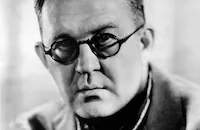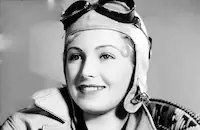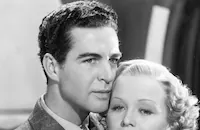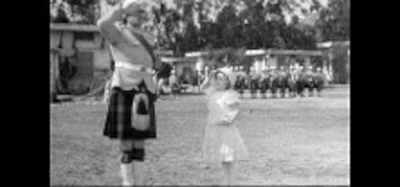Wee Willie Winkie

Brief Synopsis
Cast & Crew
John Ford
Shirley Temple
Victor Mclaglen
C. Aubrey Smith
June Lang
Michael Whalen
Film Details
Technical Specs

Synopsis
Young Priscilla Williams and her impoverished mother Joyce travel to Northern India in 1897 to join Colonel Williams, Joyce's father-in-law whom she has never met. They are met at the train station by kindly Sergeant Donald MacDuff. As Joyce and MacDuff get the baggage, Priscilla witnesses the capture of rebel leader Khoda Khan, and she picks up a talisman that he drops. At the fort, Joyce and Priscilla meet the colonel, a gruff military man not used to women and children. Fearing that the colonel dislikes her, the next day Priscilla tries to gain his approval by becoming a soldier. She first seeks help from Private Mott, a young errand boy who scornfully rebukes her. She then turns to handsome Lieutenant Brandes, whom she has nicknamed Coppy, and he hands her to MacDuff. After christening Priscilla Private Wee Willie Winkie, a nickname from a Scottish rhyme, MacDuff tricks Mott out of his new uniform and gives it to her. Later that afternoon, Priscilla visits the imprisoned Khan and returns his talisman, for which he is very grateful. Later, MacDuff orders his troops to have a special drill so that Priscilla can practice marching, but the colonel, thinking that MacDuff is making fun of him, punishes him and his men. The colonel then reprimands Joyce, telling her that she and Priscilla must stay in their quarters and away from the men. As the days pass, Joyce and Priscilla keep to themselves, until one afternoon, Mohammet Dihn, the colonel's servant, gives Priscilla a note to deliver to Khan. Soon after, on the night of the company dance, Priscilla asks the colonel, whom she has charmed by now, to escort Joyce to the dance. Unknown to them, however, Joyce has snuck out to the dance with Brandes, who has deserted his post to be with her. The evening is cut short when the rebels attack and free Khan. After the attack, the colonel arrests Brandes, and later, will not listen to Joyce's pleas, even when she declares that she and Priscilla are leaving. Despite the colonel's affection for them, he agrees that they should leave, but they are unable to go the next morning because the communication wires to town have been cut. Also that morning, a patrol returns after being ambushed. MacDuff has been seriously wounded, and Priscilla, unaware that he is dying, goes to visit him. She gives him some stolen flowers, and he dies as she sings "Auld Lang Syne" for him. The night of MacDuff's funeral, Priscilla questions the colonel about the necessity of war, and he tells her that it is Khan's fault. Priscilla then sneaks away to the stable to meet Dihn, whom she does not realize is a spy, and goes with him to see Khan. The next morning, after finding Priscilla and Dihn gone, the soldiers ride to Khan's fortress at Khyber Pass. Meanwhile, Dihn and Priscilla reach Khan, and he is overjoyed with having the child as a hostage. She tells Khan and his chieftains that they must discuss their problems with her grandfather, but as they laugh at her, Khan receives word from the colonel that the regiment will attack if Priscilla is not returned. Khan answers that he welcomes their attack, and so, knowing that the regiment will be wiped out if they charge, the colonel walks up alone. A sniper shoots at him and Priscilla runs to him, after which Khan walks down to meet them, for he does not want any harm to come to Priscilla. The trio returns to Khan's stronghold, where the leaders agree to a peaceful resolution to the hostilities. Later, at the parade grounds, Mott tells Priscilla that MacDuff would have been proud of her, and she goes to review the troops with her grandfather.

Director

John Ford
Cast

Shirley Temple

Victor Mclaglen

C. Aubrey Smith

June Lang

Michael Whalen

Cesar Romero

Constance Collier

Douglas Scott
Gavin Muir
Willie Fung

Brandon Hurst
Lionel Pape
Clyde Cook
Lauri Beatty
Lionel Braham
Mary Forbes
Cyril Mclaglen
Pat Somerset
Hector Sarno
George Hassell
Jack Pennick
Herbert Evans
Noble Johnson
Scotty Mattraw
Lal Chand Mehra
Gurdial Singh
Frank Leigh
John G. "lucky" Ball
David Clyde
Louis Vincenot
Crew
Robert Burns
William Darling
Eugene Grossman
David Hall
Roger Heman
Julien Josephson
Thomas Little
Gene Markey
Arthur Miller
R. D. Napier-raikes
Alfred Newman
Ed O'fearna
Ernest Pascal
Mordaunt Shairp
Howard Ellis Smith
Walter Thompson
Gwen Wakeling
Darryl F. Zanuck

Videos
Movie Clip




Hosted Intro
Film Details
Technical Specs

Award Nominations
Best Art Direction
Articles
Wee Willie Winkie
But according to another Ford biographer, Scott Eyman, Ford said, "My face fell atop the floor" when Zanuck proposed the idea. In the end, what probably matters most is that this ostensibly strange pairing ended up being beneficial for both star and director, and both knew it. Wee Willie Winkie is set in late-19th-century India, where a Highland regiment is holding steady against a group of insurgents. Temple's Priscilla Williams has just come to India from the States with her widowed mother (June Lang). At first, the mite's cantankerous granddad Colonel Williams (C. Aubrey Smith) wants little to do with her. But - this is Shirley Temple, after all - she eventually wears him down, and also becomes close with one of the officers under her grandfather's command, Sergeant MacDuff (Victor McLaglen, who had starred in The Informer). In the end, Temple's charm calms, at least temporarily, hundreds of years of complex religious and geopolitical conflict: Her Priscilla even manages to win over the rebel Khoda Khan (a sultry Cesar Romero), thus helping to avert revolution and bloodshed.
You could say that Wee Willie Winkie is the Shirley Temple movie for people who hate Shirley Temple: It's beautifully directed by Ford, and though he can't (or wouldn't have wanted to) completely tame Temple's total adorableness, he did temper some facets of her eager-to-please demeanor. That, it seems, was the goal all along. At a 1936 story conference, Zanuck had said, "My idea about doing this picture is to forget that it is a Shirley Temple picture....All the hokum must be thrown out. The characters must be made real, human, believable....And it must be told from the child's viewpoint, through her eyes."
Zanuck knew what he was doing, and Ford also knew how to get along with Zanuck: In addition to the sizable budget he was given ($1 million), he was able to negotiate small story changes that made the picture much better than it might have otherwise been. For example, McLaglen's character dies about two-thirds of the way through the film. Zanuck, recognizing how wonderful McLaglen's performance was, suggested changing the story so that his character would not be killed off - a change Ford knew would make nonsense of the story. Together, they worked out a compromise, giving McLaglen's character a regal - and moving -- military funeral, complete with bagpipes. Ford knew how to orchestrate that kind of pageantry, and he knew when to rein actors in, too: The scene preceding the burial, in which Priscilla visits her friend on his deathbed, bringing him a handful of posies stolen from a curmudgeonly neighbor's garden, is beautifully restrained. Ford paced the scene perfectly. Temple would later write, "When the cameras had stopped, McLaglen raised on his elbow and placed one massive hand over mine: 'If I wasn't already dead,' he said, 'I'd be crying too.'"
Ford may have originally had misgivings about working with Temple, and she with him, but by the end of the film, the two had become allies. According to Temple, Ford was wary of her at first: He trusted his other actors, giving them general guidelines on the set, but was very specific with Temple, clearly thinking that he dare not leave her to her own devices. But Ford came to realize that Temple was as consummate a pro as he was: She didn't blanch when a horse reared too close, and rejected the idea of using a double for a scene in which she climbs onto an island of rocks to evade a group of stampeding horses. Romero, too, praised Temple's professionalism: "She wasn't a spoiled brat at all. She was also very smart, always knew her lines and yours too. If you blew a line, she'd tell you what it was!"
Temple has cited Wee Willie Winkie as the favorite of all her films: "I marched, drilled, did the manual of arms, and had a wooden rifle. It was wonderful." Ford, in his businesslike way, returned the affection, ultimately accepting Temple as a colleague and friend. Their kinship, apparently, was lasting: According to Eyman, Ford became godfather to Temple's first child, in 1948.
Wee Willie Winkie is notable for another reason: In a review in the London magazine Night and Day, novelist and critic Graham Greene wrote of Temple that "infancy is her disguise, her appeal is more secret and more adult." He referenced the coquetry of some of her earlier films, and noted, "Now in Wee Willie Winkie, wearing short kilts, she is completely totsy."
Earlier, in another publication, Greene had expressed similar misgivings about Temple in Captain January (1936), perhaps priming Twentieth Century-Fox for a fight. After the Wee Willie Winkie review appeared, both Temple and the studio sued Greene for libel. The satirical nature of Greene's viewpoint, obviously lost on Twentieth Century-Fox, was also apparently lost on the judges: Temple was awarded 2,000 pounds, plus costs, and the New York and Great Britain branches of Twentieth Century-Fox were granted 1,500 pounds between them. (Night and Day folded shortly thereafter.) Greene wasn't the first, or the only, critic to point out the vaguely disturbing sexual nature of Temple's appeal. But he was surely the one who paid most dearly for it. Even at the height of her fame, Temple was not an easy performer to parse -- there's complexity there, and some danger, too. But that's also the reason there is no other child star quite like her. She knew how to win an audience over, and she could win over a tough director, too.
By Stephanie Zacharek
SOURCES:
IMDb
Scott Eyman, Print the Legend: The Life and Times of John Ford, Simon & Schuster, 1999
Joseph McBride, Searching for John Ford, St. Martin's Press, 2001
Anne Edwards, Shirely Temple: American Princess William Morrow & Co, 1988
Producers: Gene Markey, Darryl F. Zanuck
Director: John Ford
Screenplay: Ernest Pascal, Julien Josephson; based on the story by Rudyard Kipling
Cinematography: Arthur C. Miller
Music: Alfred Newman
Film Editing: Walter Thompson
Cast: Shirley Temple (Priscilla Williams), Victor McLaglen (Sergeant MacDuff), C. Aubrey Smith (Colonel Williams), June Lang (Joyce Williams), Michael Whalen (Coppy/Lieutenant Brandes), Cesar Romero (Khoda Khan), Constance Collier (Mrs. Allardyce)
[black-and-white, 100 minutes]

Wee Willie Winkie
Quotes
Trivia
Notes
After Rudyard Kipling's story appeared in the Indian journal Week's News, it was included in a book of his short stories entitled Under the Deodars, The Phantom Rickshaw, Wee Willie Winkie (New York, 1899). According to Hollywood Reporter production charts, Robert Ellis and Helen Logan worked on the screenplay of this film, but their contribution to the completed picture has not been confirmed. According to Hollywood Reporter news items, Alfred Newman was borrowed from United Artists and Cesar Romero was borrowed from Universal for the production, although Romero was put under a long term contract with Twentieth Century-Fox after the film was released. According to a Hollywood Reporter news item, actor George Hassell, who was in the cast, died while on the way to location shooting in Chatsworth, CA. Motion Picture Herald's "In the Cutting Room" includes Douglas Gordon in the cast, but his participation in the completed film has also not been confirmed. According to the pressbook, Jack Pennick, who played a soldier in the picture, was an ex-Marine who had appeared in every film directed by John Ford in the previous fifteen years. Pennick acted as a technical advisor in training Shirley Temple and others to march. The pressbook also lists Bhogwan Singh Easer Sandhu as the technical advisor who taught Romero how to wrap a turban. Contemporary sources noted that the film was processed in specially toned and colored prints, using a double and triple toning technique. The New York Times reviewer commented: "The photography, in warm sepia and restful blue tones, is a pleasant change from the ordinary black-and-white stock."
The picture's gala world premiere, held at the Carthay Circle Theatre on June 25, 1937, drew a crowd of more than 15,000 people, and was broadcast on the radio. It was also photographed for inclusion in Ali Baba Goes to Town, a 1937 Twentieth Century-Fox film starring Eddie Cantor. Cantor emceed the radio broadcast and introduced some of the attending celebrities. In her autobiography, Temple notes that she was introduced by Tyrone Power at the premiere, and that she rates Wee Willie Winkie as the best of her films. The film was nominated for an Academy Award for Best Interior Decoration.
Although Temple asserts that Norway "banned our film entirely," information in the MPAA/PCA Collection at the AMPAS Library indicates that Norway approved the picture with deletions of "drastic scenes of fight between natives and Englishmen." Eleanor Roosevelt gave the film high praise in two of her daily syndicated columns, stating: "It is charming and no one could help but like it." On October 28, 1937, the English magazine Night and Day printed a review of the film by Graham Greene, who commented on Temple's "well-shaped and desirable little body," and her "dimpled depravity." Greene called her "a complete totsy" and "a fancy little piece," and asserted that her main admirers were "middle-aged men and clergymen." According to modern sources, at least one major London distributor refused to handle the issue in which the review appeared. In November 1937, Twentieth Century-Fox filed suit against Greene and the magazine, which had ceased publication by the time the case was brought to court. According to a March 23, 1938 Motion Picture Daily news item about the suit, Lord Chief Justice Hewart called the review a "gross outrage" and awarded £2,000 to Temple and £1,500 to Twentieth Century-Fox. In her autobiography, Temple notes that her award was "recycled immediately into 5 percent British War Loan Bonds to help arm sorely pressed England against a troubled Europe."

Miscellaneous Notes
Released in United States 1937
Formerly distributed by Playhouse Video.
Released in USA on video.
Released in United States 1937














